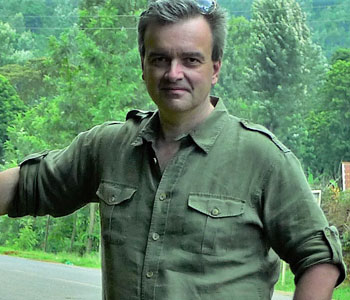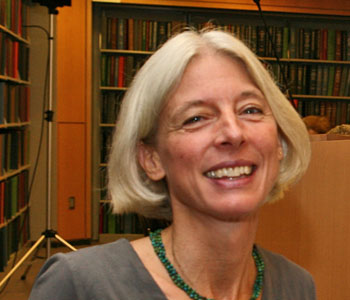Andrew Burstein
Democracy's Muse: How Thomas Jefferson Became an FDR Liberal, a Reagan Republican, and a Tea Party Fanatic, All the While Being Dead
University of Virginia Press
272 pages, 6 x 9 inches
ISBN 978 0813937229
Democracy’s Muse examines why it is that Thomas Jefferson has come to represent American ideals for all modern generations, why the most emotive figure of the founding era appeals to the political Left as well as the Right. He was the first, but by no means the last, to designate his nation as “the world’s best hope,” and that’s part of it. But his malleability says more. It says that the historical Jefferson is manipulated with too little regard for context. How can he be a big-government New Dealer and a small-government Reaganite?
Jefferson’s political sentiments have reverberated across time and space in enchanting ways. Mikhail Gorbachev said that he frequently turned to Jefferson when he was fashioning reform of the Soviet system. Barack Obama, while better known for his embrace of Abraham Lincoln, met the visiting French president at Jefferson’s Monticello home, in Charlottesville, Virginia, in recognition of Jefferson’s embrace of French culture. Donald Trump, on the campaign trail, offhandedly stated that he could foresee a monument in Washington celebrating his achievements––“but maybe I’d share it with Jefferson.” Everyone, it seems, wants a piece of Jefferson.
It’s hard to say which of the two transformative presidents adored Jefferson more: Franklin Roosevelt or Ronald Reagan. Both channeled the third president in their conception of government’s role in the lives of citizens. Given this curious conundrum, my book charts the strong statements of presidents, congressmen, and public intellectuals, from FDR’s time to Obama’s. Our self-anointed monitors of historical continuity have all struggled to define what the “Jeffersonian ideal” means to modern America’s national self-image. Sometimes they argue by resort to colorful language, and at other times they sound downright desperate.
FDR helped to design the Thomas Jefferson Memorial that proudly stands over at the Tidal Basin in Washington, D. C. He opened it to the public on the founder’s 200th birthday, April 13, 1943. At the time of Jefferson’s 250th, in 1992, President William Jefferson Clinton recalled that day, fifty years earlier, attesting to FDR’s Jeffersonian credentials, while adding his own thoughts on the illustrious Virginian. Thomas Jefferson believed, Clinton said, “in government being constantly reformed by reason and popular will.” The Economist wasn’t so convinced that the historical Jefferson had a reliable connection to ordinary people, and questioned assumptions about Jefferson universality: “He is the intellectual’s president, the president of the uncalloused hands.” In 2004, Time magazine actually queried whether President Jefferson would have invaded Iraq.
Jefferson also remains a flashpoint in national conversations about the inherently secular or religious character of the American republic. And then there’s his sexual activity across racial lines. We care about the ways Jefferson is portrayed––so much so that politicians have been known to put their own words in his mouth and repeat invented Jefferson quotes that support whatever agenda they are pursuing. Democracy’s Muse is as concerned with popular culture as with the pathos and pathology of the present partisan environment; the book weighs in on what we can and cannot know about the historical Jefferson, and why that question matters.
The discipline of history demands of professional historians that we do our best to re-encounter and faithfully restore to the modern mind the physical, moral, intellectual, social, political, emotional boundaries––the outer and inner world––that encompassed the lives of earlier generations. So, in that sense, I attempt in this book to contrast the political reality Jeffersonian Americans faced with that of modern generations. This includes the expectations citizens had from their government, and how their elected representatives “sell” a message.
What explains the tendency to give our national creation story a defining role in describing who we are as a people? Why do we expect the past to instruct us? When Jefferson penned the Declaration of Independence, the total population was 1/100 of today’s figure. As George Washington’s secretary of state, he had a staff of three. So, I see my work as a cautionary exercise in critical thinking. Historical memory is a fascinating subject all on its own.
We must be very careful before we try to extrapolate from the past, or ask the question: “What would the founders do in this or that situation?” Looking backward, the concept of “big government” versus “small government” is almost irrelevant. So, then, how should we use Jefferson? When is it actually possible to suggest what Jefferson would have said or done in approaching today’s culture wars? On race, it is impossible to say: the racial science he relied on was pseudoscience, rooted in the assumption that factors such as skin pigmentation and weather conditions were key indicators of qualities of mind and cultural achievement. On religious life and freedom of conscience more generally, I contend that the historical Jefferson was quite explicit, and indeed, still speaks to us.
When you inquire about my personal path to this book, there are two distinct answers. After writing several books about Jefferson and his time, The Inner Jefferson (1995), Jefferson’s Secrets (2005), and Madison and Jefferson (2010, coauthored with Nancy Isenberg), I still could not get out of my mind an exhibition at the National Portrait Gallery where I viewed the draft of President Kennedy’s iconic April 1962 speech to a gathering of 49 Nobel laureates. Kennedy adlibbed a line about the outstanding collection of genius before him, saying that there had not been such an assemblage at the White House “since Thomas Jefferson dined alone.” It made me think about that Jefferson.
In a very different sense, I came to write this book after “defecting” from the study of Chinese language and culture (my undergraduate major) to the study of American history. Either way, I have always sought to understand the power of language; my doctoral dissertation analyzed the emotional script in Jefferson’s prose style, especially as it derived from his letter-writing habit. His hold on the imagination has always been a function of a refined, humanistic vocabulary. In attempting to categorize the “American Enlightenment,” Benjamin Franklin is the starting point, but Jefferson was left in charge of fulfillment. Asking whether the American Enlightenment was practical in its conception or execution is a different sort of question; but the importance of understanding the hold of the past on the present makes complex, possibly unanswerable questions great motivators for a professional historian.
The book’s preface lays out how Thomas Jefferson came to be “the supremely articulate superego of the American nation,” how his Revolutionary writings translate as the conscience underlying American values. After that, I would direct readers to those pages that speak to the ways the Jefferson image was held dear by some of our most consequential presidents. For starters, at the end of 1925, several years before he was elected president, Franklin Roosevelt wrote a book review––the only one he ever published––praising Claude Bowers’s Jefferson and Hamilton. He was so enamored that he later appointed the author as U.S. ambassador to Spain. President Reagan kept favorite sayings on 4x6” notecards, and his numerous Jefferson quotes came in handy whether he was talking about married life or the evils of government.
Another representative Jefferson lover is John Dos Passos, famous for his U.S.A. trilogy, who went from being a Leftie to a Rightie over the course of several decades, without changing his opinion of Jefferson one iota. He authored two books attempting to make sense of Jeffersonianism: The Head and Heart of Thomas Jefferson (1954) and The Shackles of Power: Three Jeffersonian Decades (1966). I scoured the Papers of John Dos Passos in the archives at the University of Virginia library, and found him constantly posing (and having trouble answering) key questions that others have grappled with across generations: “When you start to write a book on Jefferson are you writing an epitaph?” he scribbled. “How much of Jefferson is alive today?”
I would suggest that the reader’s takeaway from such discussions is this: Jefferson’s writing style, unlike the stiff, less approachable work of a George Washington or an Alexander Hamilton, retains direct links to the human heart. He gets caught up in a fantastic conversation with himself about what he sees as the promise of the American political experiment. As a great bibliophile, and as an expressive letter writer whose body of correspondence has been published in large, accessible volumes, Jefferson exhibits an amazing curiosity about such areas of human endeavor as architecture, botany, classical thought, and the history of language. He was global in his concerns, seeking out superior strains of a plant, asking knowledgeable acquaintances about a Siberian expedition, purchasing a copy of the Koran. On that level, it is not surprising that he should continue to draw international scholars and a range of political thinkers to the body of his work.
Here’s something I find revealing, though it is by no means a scientific measure of anything. The portraits that grace the White House Cabinet Room have always been thought to provide insights into the management style or private inspiration of a sitting president. Presidents do decide which of their predecessors will hang in this solemn location. The one presidential portrait every chief executive from Ronald Reagan to Barack Obama saw fit to feature in the Cabinet Room is that of Thomas Jefferson. His name has been cited in a good many State of the Union addresses over the years, and the Jefferson Memorial has been the backdrop for many presidential announcements. The “camaraderie” modern presidents feel when they visit with the symbolic Jefferson (similarly, the symbolic Lincoln) most relates to two things: texts and stated principles. As the featured author of the nation’s long-form birth certificate, the Declaration of Independence, Jefferson is borrowed so as to “ground” us, to convey a certain kind of moralism, as well as achievement, that is expressed whenever the “American Dream” or “American exceptionalism” are touted in public speeches.
My hope for this book is that it might jumpstart a conversation or two about the dangers inherent in claiming knowledge of how admired historical actors would regard modern political thinking, had they survived to our time. It is absurd to insist that Jefferson is a partisan Republican or a partisan Democrat, as we define the platforms of the organized political parties of our century. Yet members of Congress have repeatedly attempted to claim Jefferson for their party, as I illustrate in the book.
In Jefferson’s exceptionally eloquent First Inaugural Address, March 4, 1801, he exhibits characteristics that express both liberal humanist sentiments and small-government advocacy. “Let us restore to social intercourse that harmony and affection without which liberty and even life itself are but dreary things” makes him sound like a conscientious liberal, seeking to remove social injustice. He says we should “unite in common efforts for the common good.” But he also calls for “a wise and frugal Government, which shall restrain men from injuring one another, shall leave them otherwise free to regulate their own pursuits of industry and improvement, and shall not take from the mouth of labor the bread it has earned.” That’s Reaganomics.
Franklin D. Roosevelt adored Jefferson for being the first American statesman to stand up for the “little man,” the laboring citizen. FDR was utterly convinced that the contest between Jefferson and Hamilton for the soul of the republic was revived in the Depression-era crisis, in which the personal greed of business moguls had damaged the lives of millions. For him, there’s “the party of business” and “the party of the people.”
Yet for Reagan, too, Jefferson reliably stands on the side of democracy. “Jefferson said that the people will not make a mistake if they have all the facts,” he once wrote.
In the twentieth century, Jefferson had a greater hold on Democrats; in the twenty-first century, he has a greater hold on Republicans, who have found a slew of enticing quotes attesting to the inherent wisdom of local citizens and the inherently oppressive tendencies of a large, centralizing, regulating government. So, it certainly seems that Jefferson isn’t done with us yet. As long as social justice remains in the hands of legislators, the emotive founder Thomas Jefferson will have some role to play in their deliberations.




We don't put paywalls. We don't distract you with ads. We don't sell your data.
Please help to keep this running!